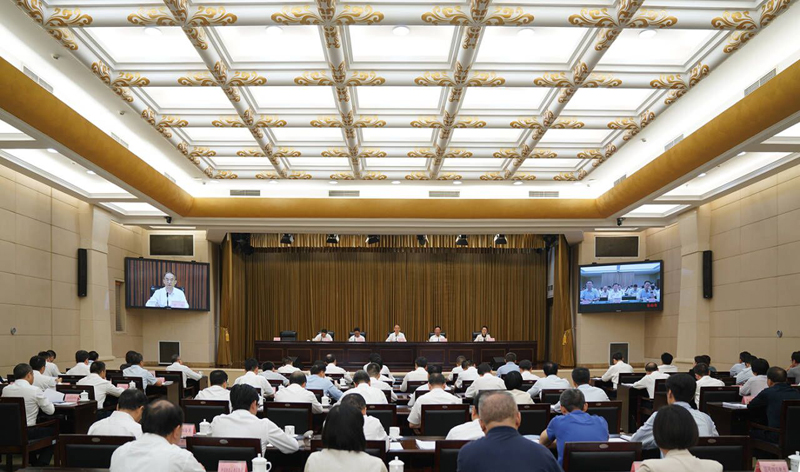
On September 18, the plenary meeting of
the leading group for the fifth national economic census in Sichuan
Province, along with a province-wide televised and teleconferenced
mobilization and deployment meeting for the "fifth economic census," was
convened. Huang Qiang, Deputy Secretary of the CPC Sichuan Provincial
Committee and Governor of the People's Government of Sichuan Province,
attended the meeting and delivered a speech. He emphasized the need to
thoroughly study and implement the important instructions and directives
from General Secretary Xi Jinping regarding the economic census. He
called for a meticulous implementation of the decisions and plans made
during the fifth national economic census televised and teleconferenced
meeting and the requirements of the CPC Sichuan Provincial Committee.
The focus should be on conducting the census lawfully, scientifically,
and in the service of the people. The goal is to complete the "fifth
economic census" with high quality and high standards, ensuring that the
results of the census better serve the high-quality development of the
entire province.
Huang Qiang pointed out that the "fifth
economic census" is a comprehensive, high-precision "scan" and a
deep-level "examination" of economic and social development. It is
instrumental in achieving the goals of maintaining economic growth and
advancing high-quality development. It is of utmost importance to
Sichuan Province and must be carried out without error. We must approach
the census from a political perspective, fully understanding and
steadfastly advancing it, taking into account its critical role in
further consolidating Sichuan Province's position on the national
economic map.
Huang Qiang stressed the importance of
diligently adhering to the census requirements, ensuring the accuracy of
the data, and efficiently advancing the work. We must significantly
strengthen data quality control and absolutely prohibit any statistical
falsification. We should ensure that all eligible subjects are included
in the census and that the data is recorded accurately. We must also
address any lingering or past problems appropriately, improve the
mechanism for tracking and accountability, and firmly uphold the
lifeline of data quality. We must rigorously adhere to the Statistics
Law and the Regulation on National Economic Census, uphold
confidentiality obligations, and effectively manage both data security
and data sharing. We should summarize and share the insights gained from
previous comprehensive pilot projects. Additionally, we should explore
the use of technologies such as AI, big data, and cloud computing to
boost the efficiency of the census through innovative approaches. We
need to focus on the key census tasks, concentrate our efforts, and
fully commit to overcoming challenges. We should conduct a comprehensive
search and precise identification of all census subjects, with special
attention to including the digital economy, building economy, and
unregistered entities, to ensure that all market participants are
thoroughly covered. We should simultaneously carry out the review of
entities and the organization of data, planning and executing these
tasks systematically and in distinct phases. We should strictly follow
the national input-output survey plan, regularly update and maintain the
sample unit database, and provide guidance and oversight to ensure that
relevant entities accurately and comprehensively report their data. We
must ensure that local authorities, industry regulators, and statistical
departments fully embrace their primary responsibilities. It's
essential to bolster support for the census teams by allocating
sufficient funding and resources and maintaining an efficient working
mechanism. Additionally, proactive measures should be taken to plan and
execute publicity, mobilize participation, and shape public opinion.
This will accelerate the formation of a synergy for joint management.
Huang Qiang also emphasized the need for
better coordination between development and security. He stressed the
paramount importance of focusing on high-quality development. Learning
from the lessons of the flood disaster in Jinyang County, it's crucial
to ensure that laws like the Law of the People's Republic of China on
Work Safety are deeply ingrained in the minds and actions of frontline
employees. This involves considering worst-case scenarios, making
comprehensive preparations, establishing a closed-loop supervision
mechanism, and being fully prepared for and responsive to the challenges
brought by heavy rainfall. Safety measures in all aspects must be
diligently implemented. While ensuring safety and quality, there should
be no delays or relaxation, not even for a moment. We need to act
swiftly and decisively, taking immediate measures to boost indicators
such as private investment, real estate, imports, and exports. This is
to ensure they recover rapidly and to guarantee the completion of annual
objectives and tasks. We must steadfastly shoulder the significant
responsibilities of being a major economically developed province.
The meeting was chaired by Dong Weimin,
member of the Standing Committee of the CPC Sichuan Provincial Committee
and Executive Vice Governor of People's Government of Sichuan Province.
Yang Xingping and Zheng Bei, both Vice Governors of People's Government
of Sichuan Province, also attended the meeting. The Sichuan Provincial
Bureau of Statistics reported on the progress of related work.
Representatives from the Sichuan Provincial Department of Agriculture
and Rural Affairs, the Sichuan Provincial Economic and Information
Department, the Sichuan Provincial Department of Commerce, the Sichuan
Provincial Administration for Market Regulation, and the Sichuan
Provincial Taxation Bureau, as well as officials from Chengdu, Luzhou,
and Mianyang, also delivered speeches during the meeting. Members of the
leading group for the fifth national economic census in the province,
officials from relevant provincial departments, as well as leaders from
various cities (prefectures) and counties (county-level cities and
districts) within the province also attended the meeting.